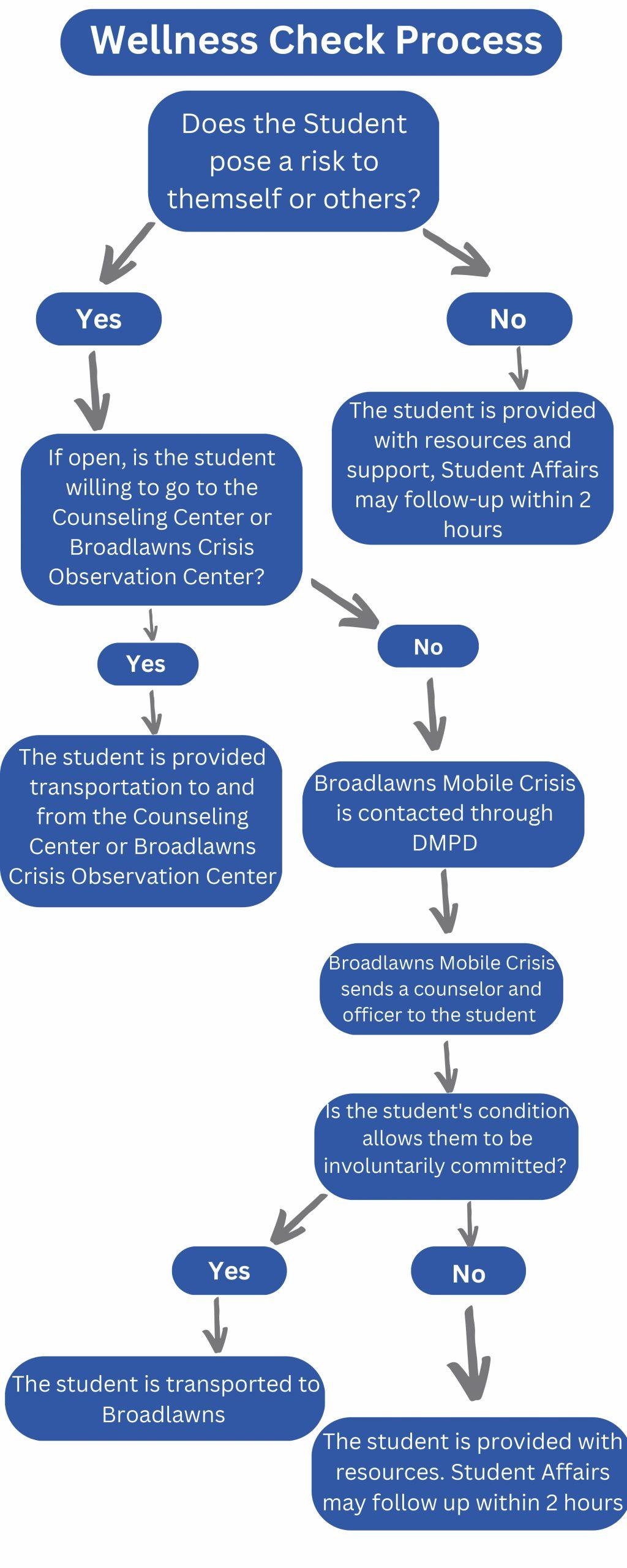Drake University students now have access to a new crisis line, 833-646-1526, through the telehealth company Uwill. Some students may wonder: when Drake believes a student’s safety may be at risk, how does the university respond?
If a student calls the crisis line and poses a threat to themself or others, Uwill will let Drake know, according to Counseling Center Director Kayla Bell.
“They would notify [the] Dean of Students, or someone that can get direct support to that student on campus [or home] in that moment,” Bell said.
Public Safety’s wellness checks
So far this academic year, Public Safety has carried out 25 wellness checks, Law said. However, not all wellness checks are for crisis situations, and suicide attempts are not included in that number.
For a wellness check, at least one Public Safety officer – preferably accompanied by a Student Affairs staff member – will visit the student’s residence. The Office of Residence Life handles on-campus incidents, while other Student Affairs staff respond to off-campus calls. Though a student’s Residence Assistant is not automatically notified when Public Safety becomes aware of a crisis situation, they often accompany the officer to the student’s room.
“Student Affairs staff have a rapport with most of the students who live in their buildings, know them well, [and] might have background information that we would not necessarily have, so we want to make sure if at all possible to have them with us,” Law said.
Once an officer and anyone accompanying them reach a student’s residence to perform a wellness check, they are required to announce their presence, knock and wait for someone to answer the door. If no one responds after multiple knocks and Public Safety has a reason to believe the student is a threat to themselves or others, they may call the Des Moines Police Department.

During a wellness check, the officer first attempts to determine whether the student poses a danger to themselves. If not, the student is provided resources related to campus wellness and Student Affairs follows up in a couple of hours. See the flowchart for details on how Public Safety addresses cases in which a student is deemed to be a risk to themselves or others.
Law said three Public Safety shift supervisors were sent to a summer training on mental health issues, particularly suicide, where they learned how to determine whether a student is a risk to themselves or others. Oftentimes, in cases when a student’s friend or other contact informs public safety that the student has expressed suicidal ideation, conversation reveals that the student is not at imminent risk of harming themselves.
“It’s rough to say, but (in) 90 to 95 percent of the calls…the student will say, ‘I was thinking this way earlier’ (or) I was thinking about it, but I don’t have a plan,’” Law said.
The Counseling Center’s role
When the university learns a student is potentially in a mental health crisis, the Counseling Center can help assess the situation, Bell said.
“…Our role is pretty much to assess,” Bell said. “To be the one that can check in to see, ok, how severe is this? …What are the things that are contributing so that we can provide adequate support in that moment? We’re also sometimes the ones that kind of define if this raises to a higher level of care.”
In the evenings or outside the Counseling Center’s hours, a Uwill counselor or another clinician or mental health professional might make that assessment, Bell said. Broadlawns and a Counseling Center counselor could also be involved.
A student might indicate a risk of suicide or a threat to harm to another person during an appointment at the Counseling Center. In these cases, the center would break confidentiality, Bell said.
If someone does express they will or have a plan to hurt themselves, the center would “likely refer to a higher level of care,” Bell said. The center could refer the student to somewhere they can receive a “more intensive” assessment, then help the student explore the recommendations from that assessment. A counselor can also reach out to get the student’s classes excused.
“If we’re going to Broadlawns… sometimes Public Safety can be activating for people, so we work with them to see, is there someone that can drive, communities or someone that you care about that can take you there,” Bell said. “Otherwise we go with them with Public Safety.”
About two years ago, Public Safety realized that calling an ambulance to take a student to the hospital for mental health reasons was unnecessary. They then contracted a taxi service to transport students to and from the hospital, which Law said has a wait time of about a half hour.
A student might also contact the Counseling Center remotely. To give an example, Bell said, a student gives a “very vague” message: “I don’t know if I can just go on in this world anymore.” The center follows up and offers to set up an appointment, and a few hours pass.
“Usually we follow up and we let a student know, ‘Hey, if I don’t hear back from you…within the next time limit, I’m going to send a wellness check because I want to make sure you’re okay,’” Bell said.
When the Counseling Center is closed, the center advises students in need of emergency mental health care to call 911 or Drake Public Safety (515-271-2222).






